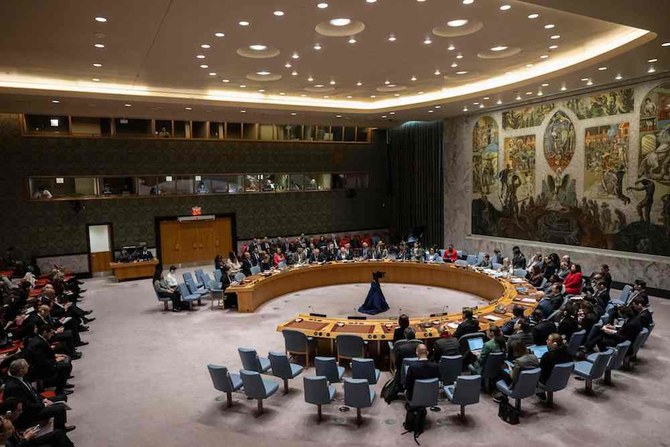
- ARAB NEWS
- 06 Jul 2025

NEW YORK: Russia and China on Friday vetoed a US-backed draft resolution at the UN Security Council on Gaza, with Moscow rejecting what it described as a “diluted formulation” of a ceasefire call that will not save Palestinian lives and fails to rein in Israel at a time when the enclave “has been virtually wiped off the face of the earth.”
Without directly calling for a ceasefire, the text “determines the imperative of an immediate and sustained ceasefire to protect civilians on all sides, allow for the delivery of humanitarian assistance and alleviate humanitarian suffering, and toward that end unequivocally supports ongoing international diplomatic efforts to secure such a ceasefire in connection with the release of all remaining hostages.”
The draft also condemns Hamas, demands the lifting of all barriers to the provision of humanitarian assistance at scale, and rejects any forced displacement of the civilian population in Gaza as a violation of international law.
Its text, seen by Arab News, had undergone six revisions during a month of negotiations.
Russia and China exercised their vetoes, while Algeria also voted against and Guyana abstained. The other 11 Security Council members voted in favor, including permanent members France and Britain.
US Ambassador to the UN Linda Thomas-Greenfield described Russia and China’s vetoes as “cynical” and “petty,” accusing both of “not doing anything diplomatically to advance lasting peace or to meaningfully contribute to the humanitarian response efforts.”
She said: “Russia and China refuse to condemn Hamas for burning people alive, for gunning down innocent civilians at a concert, for raping women and girls, for taking hundreds of people hostage. This was the deadliest single attack on Jews since the Holocaust, and a permanent member of this council can’t even condemn it. I’m sorry, it’s really outrageous, and it’s below the dignity of this body.
“Russia, who has carried out an unprovoked war on its neighbor, has the audacity and hypocrisy to throw stones, when it lives in a glass house itself.”
Her Russian counterpart, Vasily Nebenzia, said the US four times “in cold blood” cast a veto in the Security Council.
“Six months have elapsed. Gaza has virtually been wiped from the earth and now the US representative, without blinking, has been asserting that Washington has finally begun to recognize the need for a ceasefire,” he said.
Nebenzia said that “this sluggish thought process in Washington has come at the cost of the lives of 32,000 peaceful Palestinians, two-thirds of whom are women and children.”
He added that the draft is “extremely politicized,” adding that its purpose is to throw “a bone to US voters in the form of some kind of a ceasefire in Gaza,” and “to ensure impunity for Israel, whose crimes are not mentioned in the draft.”
The Russian envoy also said that the draft gave “an effective green light” to Israel to mount a military incursion into Rafah, where over 1.4 million Palestinian have taken refuge.
Zhang Jun, China’s permanent representative to the UN, said the US draft was ambiguous on the “most central issue,” that of a ceasefire, and so fell short of the consensus of council members and the expectations of the international community.
“The US draft sets up preconditions for a ceasefire, which is no different from giving a green light to continued killings, which is unacceptable,” Zhang said.
The Chinese envoy added that the US text does not clearly oppose Israel’s repeated declarations of its intent to invade Rafah, “which would send an utterly wrong signal and lead to severe consequences.”
Zhang said that if the US is serious about a ceasefire, it should vote for a new resolution tabled by seven elected members of the council and calling unequivocally for a Ramadan ceasefire. A vote on the resolution is set to take place on Saturday morning.
Guyana’s Ambassador to the UN, Carolyn Rodrigues-Birkett, abstained from voting, and said that the demand for a ceasefire should not be linked to or conditioned on the release of Israeli hostages.
“The taking of hostages is strictly prohibited in international law and the release must be unconditional.”
Two wrongs cannot make a right, she said, adding that “the Palestinian people should not be collectively punished and themselves held hostage for the crime of others.”
Rodrigues-Birkett said that although the US draft resolution “rightfully’ condemns Hamas’s Oct. 7 attacks, the text contains “no attribution or demands to the Israeli authorities for what is taking place in Gaza.”
Referring to Rafah, she said the US draft endorses continuing attacks “as long as measures are taken to protect civilians,” adding that this is “in direct contravention of the council’s responsibility.”
Samuel Zbogar, Slovenia’s ambassador, said his country voted in favor of the resolution because “the killing and starving of civilians in Gaza must stop and the suffering of hostages and their families must end.”
Zbogar thanked Egypt, Qatar and the US for their efforts to secure a deal on the ground, and said that Slovenia believes that a “strong signal of support from the council” could give negotiations an important impetus.
He also expressed deep concern over statements by Israeli officials calling for the resettlement of the people of Gaza, and rejected a possible ground invasion in Rafah.
“For Slovenia, Palestinian lives matter. Israeli lives matter. This conflict must end.”
Swiss Ambassador Pascale Baeriswyl voted in favor of the resolution, but argued for its content “to clearly reflect the request by a very large majority of council members for an immediate humanitarian ceasefire to be established without any preconditions.
“It is high time for an unequivocal request for an immediate humanitarian ceasefire to be subject of consensus at the Security Council,” Baeriswyl said.